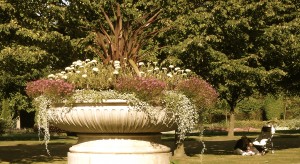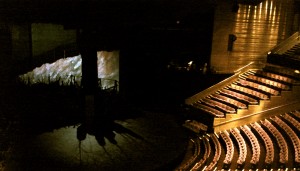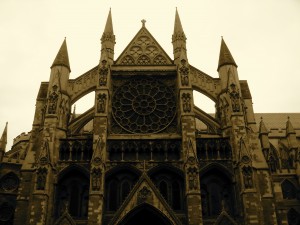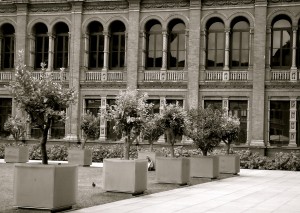September 14th, 2009 · 2 Comments
I had the chance to attend the Feminist Literature tour in which I not only learned about women writers who resided in the Bloomsbury area, but also on how spaces affect who we are and everything that we do. I am intrigued with this notion. Recently I posted a blog on space, specifically focused on sacred/holy spaces, in this blog I will look back and focus on a few others others.

Green Green GREEN
Spaces of recreation, golden flowers and perfectly trimmed grass is what I think of. It is impressive to me how well kept they are. When we visited Regent’s Park during class for the first time, I was at a loss of words, for I had never in my life seen a space so beautiful. William Blake captures this beauty in his poem titled “The Lily:”
The modest Rose puts forth a thorn,
The humble sheep a threat’ning horn:
While the Lily white shall in love delight,
Nor a thorn nor a threat stain her beauty bright.
Regent’s Park could not be touched, human hands could never be gently enough to handle a flower’s delicate body. So untouchable, the flowers arranged almost to perfection. Ralph Waldo Emmerson once said that “Earth laughs in flowers,” and I believe him.
Hyde Park, almost as magical, but words cannot capture the immensity of this park. The amount of green that surrounds you at any given moment is difficult to describe. This park in particular serves as more than just a space for recreation, it is also a place where history is preserved, where various neighborhoods unite and where kids grow up to later bring their own kids to play at Kensington Gardens or near the lake. Green Park, a sort of gateway to Buckingham Palace (if you get off at the Green Park Tube station), can never be compared to Hyde Park for it lacks in immensity. Even though the deck chairs are a nice touch to the park, the area I visited lacked some color (as in floral color); I was not impressed. (Buckingham Palace itself was not very impressive. I was surprise to discover that it actually isn’t an enormous, glorious and royal-looking mansion… I guess it’s a good thing that it isn’t after all!)

Let’s start the show!!!
Sometimes walking in for the first time takes my breath away, and sometimes the shows blows my mind, other times the idea of sitting there makes me wonder… wow. The three different halls of at the National Theatre, The Globe, Duke of York’s, the Phoenix and last but not least Royal Albert Hall! So here’s the list: “Troilus and Cressida,” “Arcadia,” “All’s Well That Ends Well,” “As You Like It,” “Pitmen Painters” and the not-so awesome musical “Blood Brothers,” oh and the amazing violin concerto at the Royal Albert. In London, I am never too far from New York City’s Broadway experience! The difference, the London experience always feels fulfilling no matter how horrible the play was. This is probably because Broadway shows are not exactly affordable, and while the National Theatre insists on having a wide range of prices (so that everyone can enjoy the theatre), Broadway just seeks revenue and to maintain it’s current status and popularity. I mean, to have Rick Fisher (who by the way is a Dickinson alum), winner of of a Tonny award, come to speak to us about his thoughts and experiences with London’s theatre scene, that within itself was enough to top all of the Broadway shows I have seen in my life! I <3 the London theatre experience!

Religious spaces.
Intricate architecture, imagination, creativity and grace is what comes to mind when I think of churches. I’ve written a blog about them but I wanted to look back at a few of them. Westminster, ridiculously sacred, marvelous, immense and glorious. The same can be said about St. Paul’s Cathedral and the Hindu Temple we visited. At Brixton (where I directed a tour along with my teammates), I learned that religious spaces play a huge role in the community, one that extends beyond any religious affiliations. One specific church we visited during our research, Corpus Christi Roman Catholic church was involved in the reconstruction of the Brixton area after the Brixton riots, when parts of the neighborhood where damaged/destroyed due to violent protests. It always brings joy to my heart when people come together to help each other, regardless of any religious/cultural boundaries.

Clubs NOT Pubs
Ooooh pubs…. I’ve heard that you can see London’s history evolve in these spaces, and although they are known as spaces of leisure and social interaction their walls can tell unknown stories of both know and unknown visitors. I am always intrigued by pubs, so intrigued I am intimidated by them. I now that sounds a little ridiculous but in pubs I feel pressured to consume alcohol (after all that is the main purpose of a pub: to provide alcoholic beverages) and to maintain conversation when really all I want to do is dance to the awesome music playing in the background. Rebbeca (who along with 4 others constructed a tour of London’s historic pubs) has attempted to both enlighten me as well as persuade me to engage in pub culture, but I have yet to fully explore the wonderful world of London’s historic pubs.
Clubs, on the other hand, I’ve also had a difficult time with. I’ve realized that there isn’t much dancing that goes on, but rather an attempt to dance, which actually means jumping around to Lady Gaga’s “Just Dance” (pop/techno song). Over all, I have enjoyed late hip hop nights at Metra (dance club a few street corners off the Leichester Square tube stop) only because I have shared that space with amazing people who can turn any floor into a dance floor. (Thanks Anthony, Jeyla and Patsy!)

Spaces, our everyday living takes place within them, whether they are churches, clubs, parks or theaters. We lack to realize their importance, we never stop to think of how a room may affect how we feel about ourselves and about the rest of society. A room can change our lives, like the reading room at the British Museum that the feminist writers group spoke of on their tour. This room clearly changed Virginia’s Wolf literature, among other authors, I’m sure.
Note to self: Whether this room is physical or mental, it is important. We must take more time to appreciate a rooms ability to change the way we exist in our own individual worlds.
The End.
Tags: Flow · Uncategorized
September 12th, 2009 · 1 Comment
How do you write about something that inspires you? How do you describe something that reminds you why you love to create? How do you interpret something that teaches you the importance of people of all classes? Well I guess you could start by giving it a name: The Pitmen Painters play at the National Theater. Now I am not a theater person myself. And although we have seen quite a few plays up to this point, Troilus and Cresida, Alls Well That Ends Well, Arcadia, none of them have sparked my interest enough to blog about them until the Pitmen Painters last night. It was so much more than a play about the struggle of the lower classes, or the search for IDENTITY in London society, or even the importance of art to modern society; it was about DISCOVERY. It touched on the heart of what it meant to strive for more, without even knowing you were striving for more, yet knowing you DESERVED more.
While the theme of artistry was what I related to the most in the play (which I will go into more detail about later on), the idea of class and personal identity separate of class identity was another theme I found moving. The class system has traditionally been very prominent in British culture. As we have seen in our various reading thus far in the class, it is still very much an existing prejudice here in London. Although we have spent most of our time studying the prejudices against many immigrant and ethnic communities of more middle to lower classes, this play focused on the disadvantage lower class uneducated miners. As these men took this art class, and began to create and fmailiaritize themselves with art, they still tried to retainer their IDENTITY as miners. Yet, when their instructors strives to use them to prove that all “lower classes” are capable of artistic achievement, the miners reject this, and strive for their own individual identities as artists, separate from other people of their class. In this way I think that the play was able to capture the essence of what we have learned from our readings, visiting various religious sites, and seeing the immigrant communities and markets. Essentially, how does one balance personal identity with group identity. At what cost to the group—whether it be religious, class, ethnic, or other social structure—does one get to be an individual, or a Londoner? Or a native? Or British? In the same way that these miners tried to maintain both identities and form a new one, migrating and immigrant groups to London must find a balance between who they were in their group, and who they want to be to fit in in London. The play also touched on a another more personal level. As an artist myself, I found the play to be especially moving on an artistic level. Since I have been to London, I have hardly drawn and have certainly not embarked on any larger scale artistic projects. There have been reasons and justifications of course, too busy, too tired, not enough space. But Oliver’s struggle to balance the pressures of his role in society as a miner, with his desire and growing passion for art and learning reminded me that art is more than a hobby. When Helen Sutherland confronts Oliver about his artistic future, she does not try to sway him by reassuring him of his talent or artistic ability, instead she tells him that he “thinks like an artist.” Art is not a thing you do, it is who you are. I found this to be one of the most touching parts of the play. It reminded me why I create. It’s not because I like to, or want to, or even because I am good at. No, I create because I have to. ART is not something I do, it is WHO I AM.
If you’re interested in my own personal art, check out my weebsite: MNL.
Tags: Megan · Theatre
A couple weekends ago, a fellow classmate informed me that William Shakespeare is the best author of all time. Though I disagreed wholeheartedly with him, it seems that I am in the minority on this point in London. Shakespeare hasn’t been alive for many years now but (as many people have noted before me) his presence is still incredibly pervasive in English life. The revised version of the Globe Theater is filled nightly with people clamoring to get a taste of the authentic Shakespeare experience. Right across the river, the National Theater makes sure to have a Shakespeare play in its rotation regularly- something that is always well attended. After watching an entertaining but incredibly over-the-top version of Troilus and Cressida, I was prepared to write a blog about how Shakespeare in England has turned into just another tourist attraction. I paid more attention to the audience at the National Theater’s presentation of All’s Well That Ends Well though and realized that I saw more people than those who toted fanny packs around the city all day (items that I’m happy to report I have seen only a small number of). The over one thousand seats that the theater has were filled with more than a few tourists but also many who actually knew what the correct response to ‘cheers’ is (something that I’m still trying to figure out). So what? Two major theaters are showing Shakespeare plays- is that so exciting? Maybe not. But walking along the streets, you are guaranteed to see big posters advertising for Jude Law in Hamlet, Judy Dench in A Midsummer Night’s Dream, and other celebrities in lead roles in Shakespeare’s plays. Clearly, the man is still alive and well in London. Again, this might not seem that interesting considering he is known as such an infamous figure not only in the arts but in history in general. But the man has been gone for over 300 years now! Many other playwrights have produced excellent works (some that are arguably even better than anything Shakespeare has ever written) yet none of them have their shows playing in multiple theaters across the city or in annual festivals. I can’t accept that his popularity still hinges on the fact that he’s Shakespeare. Even the brightest star eventually fades away. I wonder the attraction and/or loyalty to the bard isn’t more a devotion to something else- a devotion to a desired ‘English’ identity that is found in the infamous Shakespeare. This may be a stretch but it could be an interesting point to consider.
While I was surprised to see so many London locals interested in seeing a Shakespeare play, the audience was not an incredibly diverse one at either show. The locals that were at the show were seemingly (by this untrained eye’s standards) predominantly middle-upper class, white, elderly people. There are exceptions to every rule, but this was the crowd that I most observed while there. This isn’t to say that the theaters were too pricey for the majority of Londoners. You can buy a ticket to stand in the Globe for five pounds and a ticket to sit in the National Theater for ten. While some might not have money to throw away to the theater, five pounds for entertainment is truly reasonable. Still, despite the reasonable prices, the crowd that was attracted to the show seemed to be of a certain stature. I think it’s also worth noting that neither of these shows is considered one of Shakespeare’s big hitters and yet each theater was filled as one might expect for a Hamlet or Macbeth production. Clearly it’s not the show that is so attractive but rather the playwright. And why? I would argue that Shakespeare represents an identity of old London. He represents a more homogeneous London. London today is anything but homogenous. It’s incredibly diverse and is only becoming more so with each day that passes. With the word of the trip being ‘juxtaposition’, this diversity and change is clear to even the eye of an outsider. Is holding onto Shakespeare as an image for the ‘good ol’ England a means of coping with these changes? England has had many famous icons throughout its history but few (that I’m aware of) have been so closely connected to their national pride/make-up. So while the Beatles might have brought fame to the country, Shakespeare painted a picture of what English society was like. It was a society that may have been full of class division but one that knew the Classics, was incredibly mannerly, and conversed in witty and intelligent ways. Is Shakespeare’s continued prevalence a means of keeping that identity in place? I’m not entirely certain. An argument could be made on either side. Maybe people truly never tire of his shows. I would suggest that after three hundred years, picking up some Tennessee Williams or Eugene O’Neill might be a good idea.
Tags: Audrey · Theatre
London is home to one of the most vibrant and varied theater districts in the world. So far, I have been able to experience three different performances. First of all, Shakespeare’s Globe may be a Disney version of its former glory, but I still enjoyed the experience. Upon entering the groundling area and positioning myself as close to the stage as possible, I had a great spot for Trolius and Cressida. Although I did not enjoy the play while I was reading it, I found the performance extremely entertaining, and much more comic than I expected. While my feet were aching by the end of the play, I intend to return for another show. Friday night we traveled to the Duke of York’s Theater to see Tom Stoppard’s, Arcadia. I was familiar with one other Stoppard play (Rosencrantz and Gulidenstern Are Dead) and I was excited to see how this would compare. The play was the perfect blend of wit, science and emotion. Although some of the concepts were hard for me to understand (chaos theory?). I really enjoyed the fast-paced dialogue and the relationship between past and present. One of the main characters, Septimus Hodge, says, “We shed as we pick up, like travellers who must carry everything in their arms, and what we let fall will be picked up by those behind. The procession is very long and life is very short. We die on the march. But there is nothing outside the march so nothing can be lost to it.” This quote really made me think about the future. What if someone finds an article of mine… say my travel journal. What will they think? Will they try to uncover my story? Granted, I’m no Lord Byron but does that make me less important? Will I even be remembered? Will I make any sort of significant impact on the world? I probably sound selfish, wondering about how people will think of me (if they do) but I’m curious.
My most recent theater experience was yet another different feeling. While the Globe and the Duke of York were both smaller scale and more intimate, the Olivier Theater at the National Theater was grand and hi-tech. Earlier that morning I was able to take part in a backstage tour of the Theater and therefore had a greater understanding of all the behind the scenes work that goes into a large scale production. Shakespeare number two of the trip, All’s Well that Ends Well has often been considered one of his “problem plays” because it is hard to classify as a comedy or tragedy and the viewer is conflicted as to what to think. Personally, I couldn’t make up my mind as to whether Helena was silly and submissive girl or a clever woman who refused to give up. Although I found myself believing Helena was more of a ‘doormat’ more than a heroine. Ultimately, I believe that all did NOT end well. Both Helena and Bertram are still unhappy… but now they have a child on the way. Despite the ending, I thought this play had some brilliant acting (I especially enjoyed Conleth Hill’s portal of Parolles), incredible sets and wonderful lighting. It was a great way to spend an evening in London. Also, as I was not able to procure a regular ticket and had to rely on the “student standby” system. I simply arrived 45 minutes early and asked if there were any available seats. If you are willing to take the risk, you might end up with a great seat for only 10 quid. I was lucky. The room was packed and I was wonderful to see all the different people who came to se Shakespeare. Even in my own row I had a sampling of almost every class in London. I am very excited to return to the National Theater for The Pitmen Painters.
How wonderful is it that the theater is actually affordable here? If I had this opportunity in the States, I don’t think I’d do anything else. I love that spell the Theater puts on its audience…. We become so absorbed in this little world on stage that we are able to forget who we are, whatever problems we have and just live in the moment. If you’re anything like me, the imaginary world is the place to be. I can just exist in my own little seat and leave everything else behind. It’s a great escape.
Tags: Grace · Theatre
Tonight I went to the play All’s Well That Ends Well which was preformed at the on the Olivier stage at the National Theater. Though I greatly enjoyed the performance of the play, I question Shakespeare’s choice for the title.
(spoiler alert) The play began with the main character, Helena (who loves Bertram), cures the King of France of his illness and is therefore granted the choice of any man she desires for her husband. So naturally she chooses Bertram, whom does not like Helena (mostly on account of her social standing) and is appalled by the thought of taking her hand in marriage. However, he cannot turn down Helena’s marriage proposal by the King’s decree, so instead he decides to become a soldier and leaves Helena before he beds her. After leaving he sends Helena a letter saying that he will have no wife in France until Helen is impregnated with his child and possesses his family ring. After reading this Helena leaves France in search of her husband. When she arrives in Florence (where the war is) she decides to stay with an old widow and her daughter, Diana (with whom Bertram is in infatuated). She then convinces Diana to seduce Bertram and to blind fold him before Helena comes in and makes love to him (Bertram still believing that he is with Diana). So, through Diana Helena comes to possess Bertram’s ring and becomes pregnant with his child. At the end of the play she confesses what she has done and Bertram vows to always love her, yeah right!
All is not well at the end, for Bertram is still a jerk and Helena is still married to him. This is the classic story of many present day teen pregnancies: boy does not like girl so girl decides to trap boy by forgetting to take her pill (opps!) and boy is stuck putting up with girl until the child is raised. In All’s Well That Ends Well is Shakespeare trying to suggest that this method of entrapment actually effective? Or is he poking fun at those who believe it to be effective? Neither of these options make the play contingent with the play’s fairytale motif. Also, both options make this comedy funny only in a very twisted way.
I can see why this play is considered one of Shakespeare’s problem plays. Like Troilus and Cressida, it seems to confuse and confound the audience. Why did Shakespeare choose to make a mockery of the Greek and Trojan heroes in Troilus and Cressida? And why did he choose to name a tale about a teen pregnancy All’s Well That Ends Well?
However, I can see the value in All’s Well That Ends Well as a social commentary. Though the King assures Bertram that he will personally boost Helena’s position in society, Bertram still does not want to marry her because she is the daughter of a poor physician and he is a count. This reflects the English society’s belief at the time that a person’s class is permanent and does not change from the day they are born to the day that they die. The fact that Bertram finally accepts Helena once she is pregnant also reflects the norm of the time: that if a man impregnates a woman then he is forever after responsible for her well-being. In All’s Well That Ends Well Shakespeare uses these two social to show the disjointed nature of the British upper-class’ social rules. In this way I feel that Shakespeare is trying to critique the contradictory nature of these social guidelines. I am very interested in how other people read this play.
Tags: Rebecca · Theatre
After sitting in Regent Park for a couple of hours of classroom discussion I was ready to get out and move. All weekend at the National Theater “Watch this Space” was hosting a dance event, and so I threw on my leggings and I was off. Upon arriving there was a jive performance going on. There were people young and old, of all races intermingling and uniting all in one song, in one movement. Because I went by myself I didn’t get to dance, but I was immediately pulled into the vibe and the motion. There were people who were prepared for the dance, with their dancing shoes on. As the music ended they began to set up for a modern dance performance. I grabbed a mat right up front and waited for the show to start.
Over the past two years I have had the opportunity to view many types of dance ranging from modern, to contemporary, to hip-hop, to classical ballet, so I felt I was pretty well prepared to view the piece. Although StopGap describe themselves as, “modern, vintage “Britishness”, humor, and eccentric humor.” There are very slight distinctions between contemporary/modern/post-modern, and I personally think that the differences are more of an individual opinion. ChocksAway incorporated audience interaction, improvisation, talking, and some synchronized movements. It was similar to other modern pieces I have seen in the past, but it’s always a wonderful opportunity to see free, new choreography. After the StopGap performance I wandered around the National Theater and enjoyed some photography. There was an exhibit focusing on the 2008 Summer Olympics as a preparation for the 2012 games.

Later that evening I returned to the National Theater, but this time with dancing partners. I had too much trouble standing still while everyone around me was moving and so we were ready for our tango lesson. I had taken a tango class a few years back, but I didn’t remember anything so we were all starting fresh. (And for the first time I didn’t have to lead!) I was thrilled that everyone seemed to enjoy him or herself, because for most of our group this was their first experience in a real dance environment.
For me dance isn’t just about the steps, but it’s about the conversation with ones dance partner. It’s about a connection with your body, and for many in a dance like the tango, or salsa, or jive it’s is a connection with your partner’s body too. I love the joy and the satisfaction that comes with the beat and the rhythm, and just the movement of the body. I am filled with excitement every time I interact with dance, or see dance. I am looking forward to seeing what other dance opportunities this city has to offer.
Tags: Amanda





